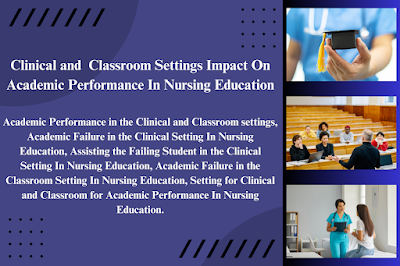The Clinical and Classroom Settings Impact On Academic Performance In Nursing Education. Clinical learning environments (CLEs) are essentially any place where students (and other students) learn about patient care, from the bedside to the equipment room, from the emergency room to the operating room, from the clinic to the ward.
The Clinical and Classroom Settings Impact On Academic Performance In Nursing Education
A fundamental responsibility of nursing faculty involves evaluating students’ academic performance across both classroom (didactic) and clinical settings. Effective student evaluation is crucial at all educational levels and necessitates careful consideration due to its profound implications. Studies have shown that the main challenges nursing students face in their clinical training are violence, anxiety and fear, sociocultural challenges, organizational-ecological stress, and ineffective clinical training.
The process of evaluating nursing students requires not only technical proficiency but also an understanding of the emotional, financial, and institutional consequences associated with academic assessments. This comprehensive review examines the impacts of academic performance within these settings, explores issues related to academic failure, and outlines strategies for assisting students who encounter difficulties.
Academic Performance in Clinical and Classroom Settings
Nursing faculty are tasked with assessing students’ progress and competencies in both classroom and clinical environments. This dual responsibility underscores the importance of having robust evaluation mechanisms to ensure that students are meeting educational standards and are prepared for professional practice. Evaluation outcomes significantly affect students’ academic trajectories, influencing their advancement in the program, with potential consequences including course repetition, delays in graduation, or even dismissal from the program. These outcomes can have substantial financial, emotional, and personal repercussions for students.
Faculty members may face their own set of challenges, including emotional distress, administrative pressure to maintain enrollment numbers, and a sense of personal failure when assigning failing grades. Thus, it is essential for faculty to be acutely aware of the legal and ethical considerations involved in the evaluation process. Inadequate preparation or understanding of these factors can lead to complications, underscoring the need for thorough training and clear guidelines.
Academic Failure in the Clinical Setting
In the clinical setting, nursing faculty play a pivotal role in guiding students through the development of essential nursing skills and professional values. Faculty are responsible for ensuring that clinical learning experiences are designed to foster the competencies required for safe and effective practice. This includes applying theoretical knowledge, developing psychomotor skills, utilizing appropriate communication techniques, and demonstrating decision-making and organizational abilities.
When students fail to meet the objectives of their clinical experiences, faculty have both legal and ethical responsibilities to address these deficiencies. Legal frameworks, such as state Nurse Practice Acts, provide guidelines for regulating nursing practice and education, and they support the dismissal of students who fail to demonstrate clinical competence. Graduating from a nursing program should signify that students have met the minimum competencies necessary for safe practice. Students are expected to adhere to professional standards and seek assistance when needed. They are held accountable for their actions and must meet the same standards as licensed practitioners.
Faculty members must also ensure effective supervision and communication within clinical settings. The clinical agency contract often stipulates the need for adequate supervision by the nursing school, and failure to maintain acceptable performance levels can result in the loss of clinical sites for future use. This underscores the importance of maintaining high standards of performance and clear communication between faculty, students, and clinical staff.
Assisting the Failing Student in the Clinical Setting
When a student is struggling in the clinical setting, faculty must provide support and intervention strategies. This includes setting clear performance expectations and communicating them effectively before the onset of clinical experiences. Expectations should be realistic and applied consistently to all students. Faculty must also assess the appropriate level of supervision based on the complexity of patient conditions and the student’s competence. Regular feedback and opportunities for remediation are essential to help students improve their performance.
Faculty are responsible for evaluating whether students can effectively apply classroom knowledge to clinical practice. This includes assessing students’ abilities through written care plans, verbal explanations of patient assessments, and reflective journaling. Such assessments provide insights into the students’ clinical reasoning and decision-making processes, allowing faculty to identify areas for improvement and tailor support accordingly.
Academic Failure in the Classroom Setting
In the classroom setting, academic failure can result from various factors including inadequate understanding of the material, ineffective teaching methods, or personal issues affecting student performance. When students fail to meet academic standards in the classroom, the consequences can be severe, affecting their progression in the program and potentially leading to academic dismissal.
To address academic failure in the classroom, faculty should implement strategies to identify and support struggling students early on. This can include offering additional resources, such as tutoring or study groups, and providing constructive feedback on performance. Faculty must also ensure that instructional methods are effective and adapt to the diverse learning needs of students.
Setting for Clinical and Classroom Academic Performance
The learning environment plays a crucial role in student academic performance. In the clinical setting, it is essential to provide a supportive and structured environment that fosters skill development and professional growth. This includes maintaining clear lines of communication, offering appropriate supervision, and ensuring that students have access to necessary resources.
In the classroom setting, creating an engaging and inclusive learning environment is equally important. Faculty should employ a variety of teaching strategies to address different learning styles and ensure that course materials are accessible and relevant. The integration of technology, interactive learning methods, and timely feedback can enhance the educational experience and support student success.
